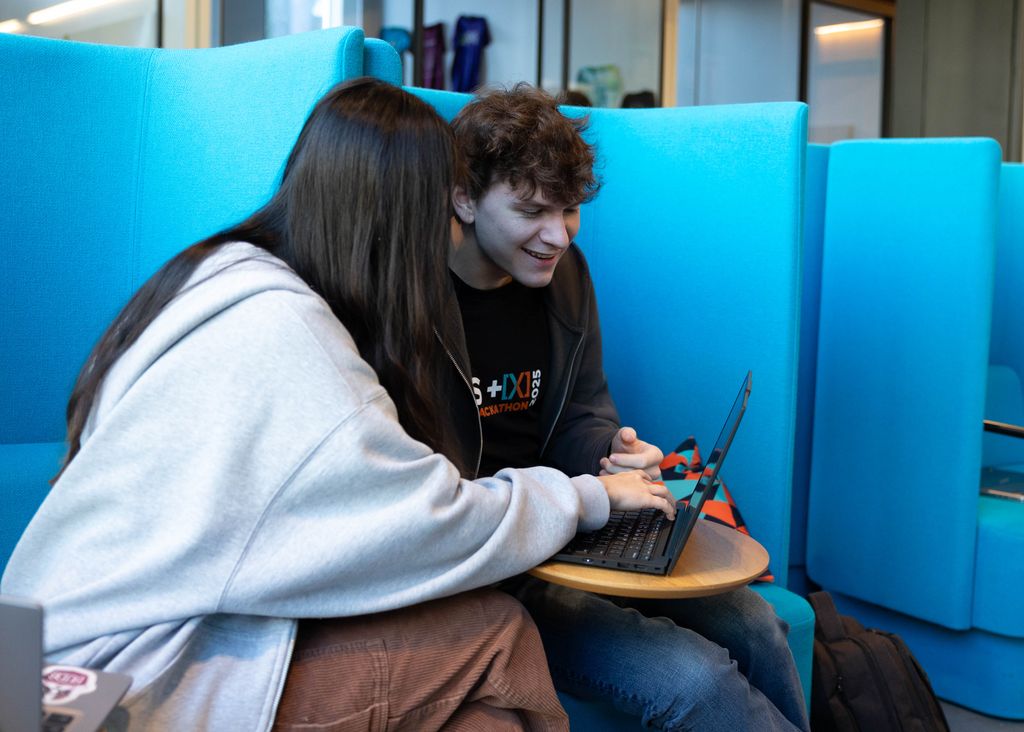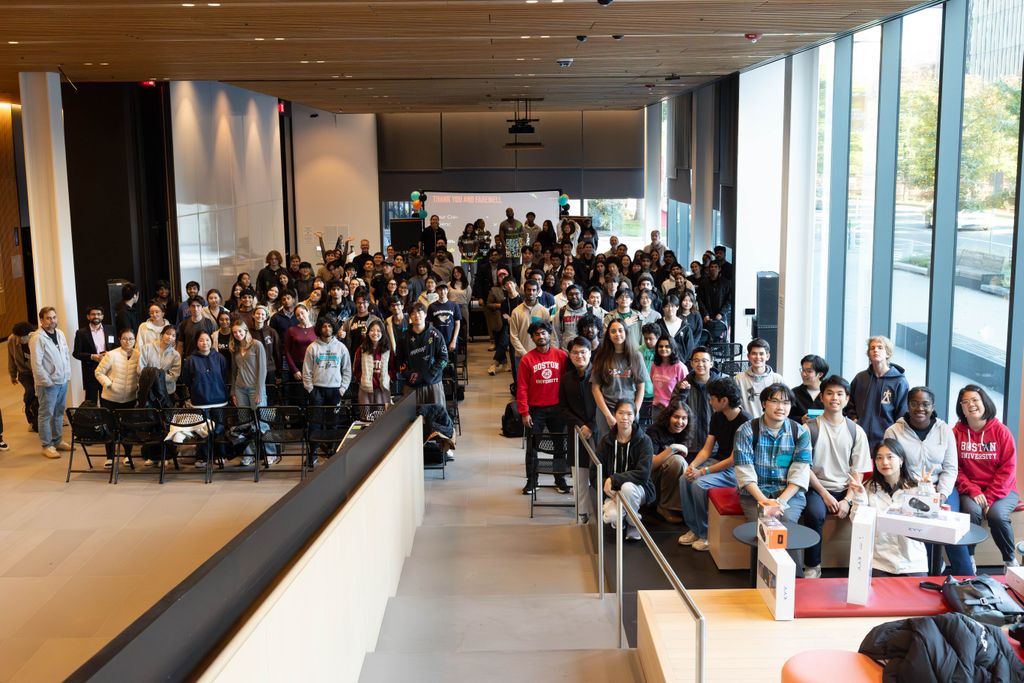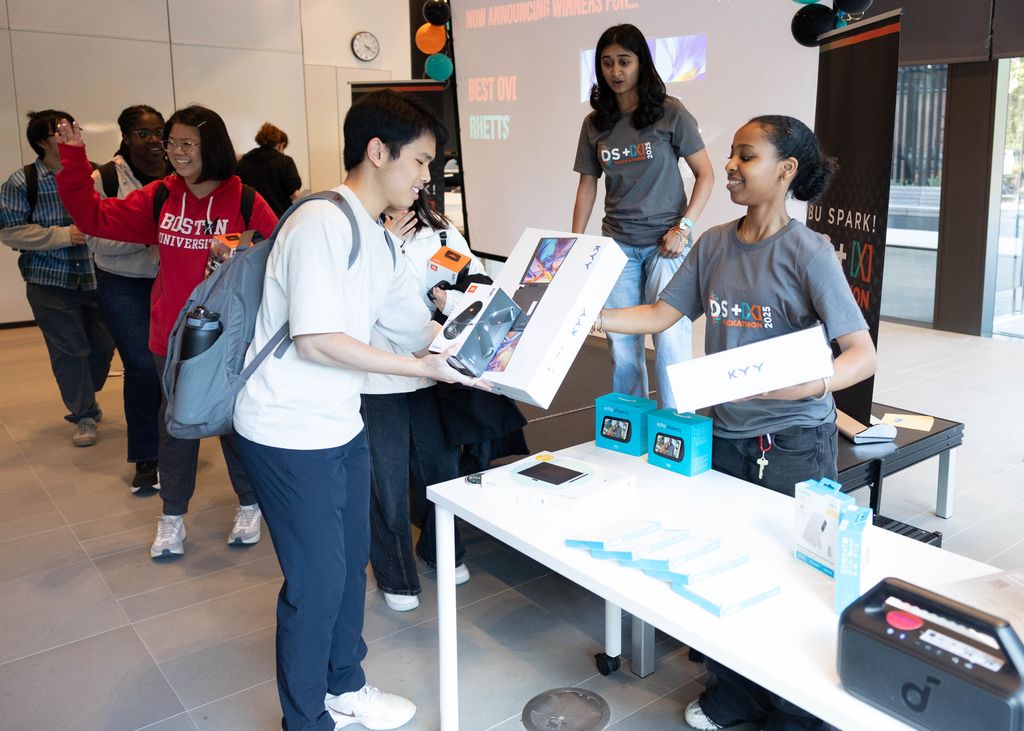Where Data Science Meets Imagination: Inside BU’s DS+X Hackathon
At Boston University, hackathons aren’t just about crafting flawless code anymore — they’re about creativity, connection, and impact. The DS+X Hackathon, a collaboration between BU Spark! and the Faculty of Computing and Data Science (CDS), took that belief to heart on October 25-26, 2025, at the Duan Family Center for Computing & Data Sciences.
Led by students Imran Hussien and Alena Patel, alongside teammates Kadiatou Diallo, Khaleel Nafiu, and Makeda Hailu, the DS+X hackathon leadership team spent months crafting an experience that felt less like a competition and more like a creative playground for the nearly 200 student hackers in attendance. With guidance from Ziba Cranmer, Spark!’s Founding Director, they built something that reimagines what hacking can mean and who it’s for.

A New Kind of Hackathon
The “X” in DS+X was intentional — and wide open. It’s a variable for whatever moves you. Data Science + Climate. Data Science + Public Policy. Data Science + Justice. Data Science + Whatever you’re passionate about.
The event was born out of a shift the organizers call “Hackathon 2.0.” Gone are the days when hackathons were about isolated technical puzzles with no connection to the real world. DS+X is about crossing disciplines, mixing passions, and seeing what happens when data science collides with art, ethics, design, and storytelling. As Hussien puts it, “Data science is no longer just a technical skill — it’s a creative, civic, and connective force,” he says.
This force came to life across a multitude of tracks: Art + Computing, HackBU, First-Year, and an Open Track. Each track offered unique challenges, mentorship, and prizes tailored to their interests.
An Inclusive Space for All
A core goal of DS+X was to make hacking accessible, not intimidating. That’s why the team created a dedicated First-Year Track, giving new students a guided, low-pressure space to explore. Workshops covered everything from coding basics to project storytelling. Mentors were on call for questions big and small (literally — there was a “No Stupid Questions” zone). And a special set of First-Year prizes ensured beginners were recognized for their ideas despite their limited experience.
The Open Track: Passion Takes the Lead
If the First-Year Track was about access, the Open Track was about imagination. Instead of being handed a problem, participants worked with possibilities. Here, “X” could mean anything from climate action, accessibility, mental health, music, and fashion — in other words, whatever sparked curiosity. Students built projects that reflected who they are and what they care about, proving that the best ideas often come from unexpected intersections. “It’s a space to roam, remix, and prototype ideas that reflect your passion, powered by data science,” Hussein says.
🏆 DS+X 2025 Hackathon Winners
This year’s submissions showed just how boundless “X” can be and redefined what’s possible when students merge creativity with computation. Check out the full list of submissions here.
Best Overall (+ HackBU 1st Place)
At Boston University, we noticed something: many students are curious about research — they want to explore, create, and make an impact — but they don’t know where to start. Opportunities often feel hidden behind walls of information, unclear requirements, or scattered resources. At the same time, professors are looking for passionate students who align with their projects but struggle to find them efficiently. We wanted to bridge that gap — to turn curiosity into action.
That’s why we built Research Dashboard (RhettSearch), a platform that helps students discover their research style, connect with mentors, and explore real projects around BU. It’s not just a tool; it’s a launchpad for discovery — helping every student take the first confident step toward becoming a researcher.
Best Technical Execution
Financial markets are a fundamental part of the economy, yet many people do not know how they work. For most people, it is a very daunting task to develop skills in navigating such a complex field. Unless you have an expert, you’re on your own to learn apps like WeBull and Fidelity from the get-go. Everybody has the potential to benefit from learning how to invest successfully long-term. Still, the huge skill gap and research required to understand day-trading and general stock trends discourages most from even attempting such a thing. Our project allows people from all backgrounds to learn the principles of investing in a simple and beginner-friendly way. The Stalk Market utilizes AI to allow communities to learn about stock interactions and economic behavior through simple but dynamic farming game mechanics.
Best Technical Implementation
What if…. What if you could TALK to your maps! We’ve all used map apps that work, but don’t really listen. You ask for help, and they just follow commands. They don’t understand the context, the conversation, the emotion, or what you actually mean. That’s where the idea for Atlas-Talks was born.We wanted to create something that feels alive! And we wanted to go after something that doesn’t exist in almost any form in the industry. Atlas-Talks is an intelligent, real-time navigation system. It processes live data, understands conversational cues, and coordinates responses that make sense both in chat and on the map. It can follow your requests. You can literally ask it in human language to show around the maps the locations you desire, with tons of customizations, real life cues.
ArtHack Winners
SightBoard is a lightweight, browser-based sketchpad that lets you draw using either traditional controls or facial movement tracking. We wanted to explore alternative tools for creating art, and thus we created a new way for artists to create not with a pencil, stylus, or mouse, but with their eyes! It combines familiar tools like draw, erase, fill, and clear, with our biggest focus being the tracking mode, where a floating cursor follows your sight. You can start or stop drawing while tracking stays on, and fine-tune Sensitivity and Line Blending to your liking.
Percent is an interactive web tool that helps designers, typographers, and learners explore the relationship between form, contrast, and structure in typefaces. As MFA Graphic Design students at Boston University, we were first introduced to type design through Robofont. While learning how to construct our own letterforms, we found it challenging to understand how small changes in a curve could affect the entire shape of a letter. To make sense of this, our professor showed us examples of how geometry plays a role in type design. Then we proceeded to manually draw circles inside our letters, trying to visualize how contrast and proportion interact within type design. This playful experiment became the inspiration for Percent, a tool that transforms the anatomy of letterforms into interactive, sphere-based visualizations.
FirstHack Winners
This project started from a simple idea: many people, especially students and late-night travelers, do not always feel safe getting from one place to another. Most navigation apps only focus on speed and distance, not safety. We wanted to build something that helps users feel protected by choosing routes that are safer, better lit, and more reliable.
One of our team members has dietary restrictions and struggled to use the slow and unintuitive BU Dining website that also didn’t provide all the features he desired. We built this web app to help students deal with dietary restrictions and allergies and find meals at the three main dining halls at once.
Our application helps store employees better stock shelves according to expiration dates and complete inventory with the intention of reducing food waste. Some of our team members have worked in the food industry, and it’s known that a significant amount of food goes to waste due to inventory issues. After adding all the information about the products, you will be alerted if a product is about to expire and what aisle the soon-to-expire product is located in. The code gives you the opportunity to put a product on sale and it will internally update the price of the item. If you choose not to put the product on sale, it will recommend next steps for what to do with the soon-to-expire product.
HackBU
CollabNet
In academia and industry alike, research thrives on collaboration. Yet finding the right collaborators—those who share overlapping interests, complementary expertise, and compatible working styles—remains a challenge. We were inspired by the idea of harnessing the wealth of information in open academic databases to build a smarter collaboration tool. By visualizing co-authorship networks and research trends, we wanted to make it easier for researchers to discover potential partners and accelerate innovation. CollabNet makes finding research partners at BU effortless — a data-driven platform mapping projects and people to spark smarter, faster, interdisciplinary collaboration.
Cognify
Your digital advisor: course planning made easy. As BU students, especially underclassmen trying to navigate BU’s vast range of courses and complex requirement system, we felt the current manner in which course planning was approached at BU was overcomplicated and sought to simplify it. Thus, we built Cognify to simplify and streamline this process for all BU undergraduates.
PlanEdu
PlanEdu is an AI-powered planner for BU students. It creates your 4-year schedule, taking your major, prerequisites, and even RateMyProfessor ratings into account. Stop stressing and start planning. PlanEdu was inspired by the universal stress every Boston University student faces during registration. Planning a 4-year schedule involves juggling complex major requirements, Hub units, prerequisites, and endless RateMyProfessor tabs across a dozen different spreadsheets and websites. We knew we could build an AI-powered tool to simplify this entire chaotic process into a single, intelligent platform.
BU Smart Bus
Getting around BU shouldn’t feel like guesswork. Every student knows the pain — standing in the cold, refreshing the existing BU Bus app, wondering “Is the bus even coming?” We asked: What if navigating the BU bus felt as seamless as Google Maps or Uber? That’s how BU Smart Bus was born — a modern, data-driven, empathetic, and real-time transit companion made by students, for students. Built to reduce the daily uncertainty of waiting for the BU shuttle, BU Smart Bus helps students and staff plan confidently with real-time tracking, smart service alerts, and personalized favorites.


